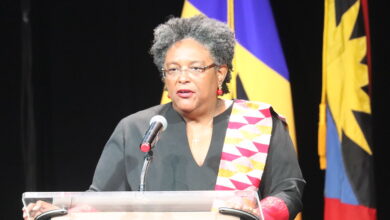BASSETERRE, St. Kitts & Nevis (Dec. 14, 2011) — Defense and security leaders from 17 nations completed a two-day Caribbean region security conference here today where they discussed proposals and cooperative solutions to counter transnational crime, illicit trafficking and support to humanitarian operations.
Sponsored by U.S. Southern Command (SOUTHCOM) and hosted by the Saint Kitts and Nevis Defense Force, the 2012 Caribbean Nations Security Conference (CANSEC) was planned by participating countries with the theme, “Regional Information Sharing to Combat Transnational Organized Crime and assist Foreign Humanitarian Assistance and Disaster Response.”
This year’s conference included briefings, discussions and meetings focused on improving collaboration and coordination among regional security forces.
“I think the most important thing we can do is focus on what capabilities we have today. And with those capabilities, what can we do to improve how we are addressing our collective security concerns,” U.S. Air Force Gen. Douglas Fraser, SOUTHCOM Commander, told attendees in his opening remarks. “By focusing there, it breaks through a lot of the barriers and concerns and allows us to directly talk about what we can do and builds a very, very firm foundation that we can build on as we work in the future.”
Attendees discussed how regional security forces can leverage existing and emerging information technologies to facilitate combined efforts to counter transnational organized crime and the illicit trafficking of drugs, humans and weapons that form the backbone of their existence.
Fraser noted that from a regional perspective, the biggest concern is in Central America, which has seen significant increases in violence in recent years and an area “where 90% of the cocaine coming out of Colombia enters the United States.” But, the shifting and adaptive nature of transnational organized crime demands a persistent, hemispheric approach to deal with the threat.
“If you go back 20 years, the Caribbean was much more a focus of where the transnational organized criminal organizations were focused, running through the Caribbean directly into the United States. As pressure was put on those avenues, they have shifted… and they have shifted into Central America,” said Fraser.
Fraser said that the United Nations “sees a shift starting to happen again back into the Caribbean.”
“I know that you see that on a day-to-day basis,” Fraser told the attendees. “That’s why, as we look across the region, I see [the threat] as a regional issue, as a hemispheric issue and one that we have to continue to work together.”
SOUTHCOM security cooperation and engagement efforts in the region include a series of multilateral exercises, professional military-to-military engagements and the provision of security capabilities.
U.S. military support is one part of an overarching U.S. government effort to counter the threat of illicit traffickers in the Caribbean.
Much of SOUTHCOM support to the region falls under the Caribbean Basin Security Initiative (CBSI), a regional security-partnership initiative first announced by President Barrack Obama during the Fifth Summit of the Americas in 2009.
CBSI is one of four U.S. led security assistance initiatives now underway in the Western Hemisphere. The other initiatives are the Merida Initiative to assist Mexico, the Central American Region Security Initiative (CARSI), and support to Colombian internal security efforts. U.S. military support to CBSI includes the Secure Seas program, which provides patrol boats and communication suites to Eastern Caribbean nations to help them counter illicit trafficking in their territorial waters.
On the humanitarian and disaster relief front, attendees discussed continuing efforts to enhance information sharing capabilities to improve collective responses to major storms and other disasters.
Fraser shared some of his insights from last year's support to international relief efforts following the major earthquake that ravaged Haiti. He stated that because there were so many different sources of information, that too often response forces spent more time trying to determine what the situation was in Haiti rather than focusing on what to do.
“It was only when we put together a consolidated report from all the organizations that were helping support the government of Haiti, and put it into a routine, daily update that came from all organizations involved, that we started dealing directly with how we confront and how we deal with those issues,” said Fraser.
He stressed that the Haiti experience highlighted the need for a platform to provide persistent situational awareness to speed critical relief support.
“Establishing the routines in how we share that information, so that as a disaster strikes, there’s a vehicle and a venue and there’s training and awareness of how to use that vehicle to get a picture very quickly,” Fraser said. “We have made some progress from the decisions we made last year… of building information sharing capabilities. We will have some proposals [during the conference] that we’ll put on the table as well as we look for ways to improve that.”
Joining the U.S. and St. Kitts and Nevis during this year’s CANSEC were: Antigua and Barbuda, Bahamas, Belize, Canada, Dominica, the Dominican Republic, Dutch Caribbean, French Antilles, Grenada, Haiti, Jamaica, St. Lucia, St. Vincent and the Grenadines, Suriname and Trinidad & Tobago.
Representatives from the Caribbean Community (CARICOM), the Regional Security System (RSS), the Inter-American Defense Board, the U.S. State Department, U.S. Northern Command, and Joint Interagency Task Force-South also took part in the conference.
Observers from other regional organizations and nations, including Canada, the Netherlands and the United Kingdom, also attended the event.
Traditionally, the location of the CANSEC conference rotates among countries of the region. The 2011 conference was held in Trinidad and Tobago.
News




